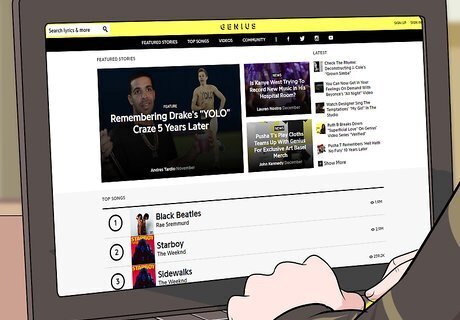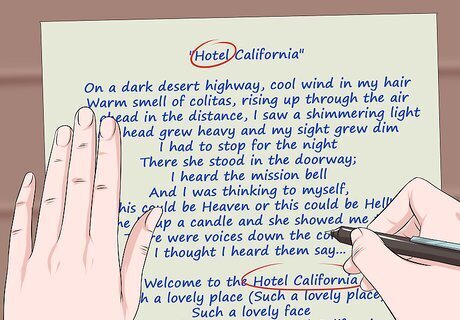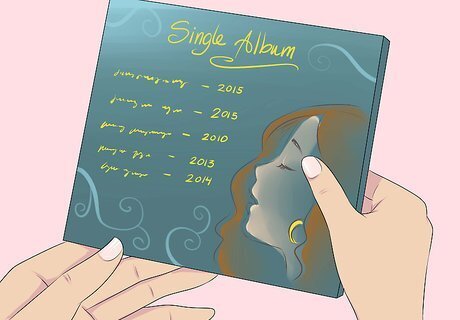
views
Understanding a Song's Lyrics

Listen to the song while reading the lyrics. Pull the lyrics up online to make sure you're not mishearing any of them. For now, just focus on your first impressions. What do you think the song is about? What parts confuse you, and what parts seem perfectly clear? There are no wrong answers, as your first impressions help decide the feel and theme of the song. What is the overall mood of the song? How do the lyrics match up with the instruments? Do they have a similar feel or are they conflicting with each other?

Read the lyrics on their own to decipher their meaning. Great lyrics are a form of poetry, and reading them without the distraction of instruments can help you parse out their intent. When reading the question, ask yourself the same questions you might ask about a poem: Who is the speaker? Don't just assume that the speaker is literally the singer -- they could be playing a character or referencing a larger issue. If there is a "you" or a "we" in the song, who does this refer to? A lover? A friend? A politician? What are the major images or ideas that keep popping up?

Focus on concrete imagery and senses. Good lyrics have a "visual" component as well. They describe a scene or feeling with images, not just vague ideas or phrases. If you were making a movie of the song, what would be the images that keep cropping up? By visualizing the song as a scene, do any of the most confusing lines start to make sense? Where does the song take place? This could be a very specific location, like Kent State in Neil Young's "Ohio," or something vaguer, like a girl's bedroom in Taylor Swift's "Love Story." "New Slang" by The Shins starts with the line "Gold teeth and a curse for this town were all in my mouth // only I don't know how they got out, dear." This may seem confusing, but later lyrics show that he was being rude at a bar. He got punched in the face for saying his "curse."

Unpack unusual or poetic phrases one at a time. Metaphors and figurative language are when the words don't literally mean what they say. When Bob Dylan suggests that "the answers, my friend, are blowing in the wind," he doesn't actually mean the answers are flying in a breeze. He means that the answers are simple and all around us if we just take the time to stop and look. When faced with unusual sections, ask yourself if they may stand for something other than what they appear. Look for comparisons and commonality. Most metaphors aren't perfect, they simply draw a simple line between two things. "My love is a rose" doesn't necessarily mean a woman is red, slender, etc. It likely means she is beautiful but also dangerously thorny. Search online for images or ideas you don't understand. They may come from movies, other songs, old myths, etc.

Check a lyric annotation site for additional clues. Sites like Genius.com allow anyone to annotate lyrics with interpretations, explanations, and definitions of each line. Even better, the actual lyricists often write their own notes on the site, which are labeled and verified to help you understand more oblique lyrics. Try out SongMeanings, SongFacts, and LyricInterpretations, as well. Note, however, that you don't have to agree with every annotation put up by other people. These sites are great places to start breaking down complex sections, however.

Remember that there is rarely one "right" meaning. The Eagles' "Hotel California" is one of the most debated songs of all time, because so many people have so many interpretations of it. Some think it references the music industry, which traps you with promises of wealth. Others think the hotel is a gateway to Hell, trapping wayward sinners. A few believe it is just a fictional story of a dangerous place. None of them are totally wrong and none are totally right. What is most important is that you can defend your position with evidence from the song. As long as you can back up your meaning with actual lyrics or stories, it is a valid meaning. Most artists will even admit that they don't know the song's full meaning. Writing lyrics can be subconsciousness, and the meaning people get from listening to a song is just as important as the meaning when writing it.
Understanding the Overall Song

Listen to the album the song came from for clues to larger themes. While not all songs are part of a larger message, many songs make more sense in the context of the whole album. Are there other songs that hint at a similar meanings or themes? Are there characters, images, or ideas that keep cropping up in other songs? What songs come before or after the song you're listening to? Do the shifts in mood or tone between songs tell you anything? The first song and last song generally set the theme. If the song came first, what kind of mood does it set for all the songs after it? If it comes last, what kind of tone does it leave the listener on?

Read into the song's historical context. Charles Mingus's famous jazz song "Fables of Faubus" means very little if you don't know that Governor Faubus tried to prevent desegregation in Arkansas. The famous Fleetwood Mac album Rumors makes much more sense once you realize that, at the time, everyone gossiped that the band members were secretly dating. Many songs only make sense in the year they were released, as they explicitly address current events. Look up the year the song was released or written, as well as any major current events from that period. Does anything seem familiar? Sometimes artists will talk about personal issues that influenced songs years after they were released. For example, Kanye West's second album, Late Registration, talks a lot about fame and money, whereas his first album, The College Dropout, talks about the struggles of a starving artist.

Consider how the tone of the instruments matches the song's lyrics. How do the instrumentals make you feel -- dark and moody, happy and bouncy, slow and contemplative, high-energy and rocking? Sometimes there will be a disconnect between the lyrics and music, which points to more meaning. For example, if there are melancholy lyrics but a happy backing track, you can often assume that the lyrics are supposed to be funny. They could also show an interesting contrast -- the world around the singer might be happy, but the singer is not. Third Eye Blind's famous "Semi-Charmed Life" is about a crushing meth addiction. The happy background music symbolizes the quick but high-tempo high the characters get, even as they are ruining their lives.

Note how the song changes from beginning to end. A clue to many songs' meanings comes from their progression. If you think about the song as a speech from a friend, what was the point of the speech? How did their mood or perspective change from the first line to the last? If you have noticed a change in the song, go back and find the line or lines where it occurred. A sudden twist or change is often called a "turn." For example, if the singer is pining over a girl in the beginning but seems happy at the end, what was the line where the singer's luck "turned?" This is often your biggest clue to a song's meaning.

Watch the song's music video, but be careful of added confusion. Music videos can sometimes help show a song's meaning, but they can also make it far more confusing. That's because many music video directors are telling short stories that may or may not line up literally with the lyrics. Instead, they tend to match the mood or tone of the song without directly portraying what the song means. What is the theme of the music video? This often will match the song's theme, even if the stories are different. For example, a video may show two people fighting, smashing their own house, while the song is about politics or current events. The theme may be that people are hurting themselves from the inside. Many music videos are purely aesthetic. That means they are meant to look pretty without really exploring the song's meaning.

Know that many songs don't have complex meanings. Some songs are just songs -- they cover a wide range of ideas or topics, describe a straightforward love, or are simply made to get people dancing. If you've dug into the song's lyrics, looked up its background, and understand the references, but still don't see an overall meaning or point, there probably isn't one. Just enjoy the song and the deeper understanding you've gained of it and move on.




















Comments
0 comment